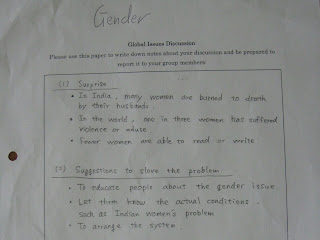Agenda for Meeting 5
I Review
What are symbols?
What are heroes?
II Main Agenda:
What are rituals?
What are values?
General definition
Discussion on "Maybe we go skating"
1. What were the values of the two groups?
- Japanese girls were cooperative. We don't like isolation. The standing nail gets hammered.
- Japanese girls' value is harmony with other people.
2. What was the conflict?
- They did not try to understand each other's values.
3. Were these girls' values similar to your own?
- Yes and no: When I talk with friends it is yes but in class we debate with others.
- In the same situation it is yes because especially in Japanese we have fellow feeling.
Hofstede's 5 Dimensions:
1. Power Distance:
Should teachers’ authorities be challenged?
- Yes. Because if they make a mistake (time, stereotpye) we have to change the worng to the right.
- Sometimes yes and sometimes no. In the case of the stereotype, we say you are wrong because we are not sure that "all Japanese like sushi" so we say I think you are wrong softly. In the other kind of stituation, if I have time we do not say you are wrong but if we are in a hurry we tell the teacher "I have no time, we have class by 12."
2. Individualism:
Should all students be treated the same?
- We think yes and no. Because in complusory education it is yes but in another education, for example, high school and university it is no.
- Alm,ost the same but in elementary school sometimes 習熟度別学習 is good. For example once a week, and after school.
3. Masculinity:
Should fighting among kinds be tolerated?
4. Unvertainty Avoidance:
Can teachers say, “I don’t know”?
5. Long-term Orientation
Which do you agree with most?
Marriage is for love.
Marriage is for starting a new family and contributing to your own family.
III Preparation for Next Meeting:
As a comment to this post, please write the following:
How well did you understand the talk on values?
A: Very well
B: Well
C: Not so well
D: Not at all
What was easy for you to understand and what was difficult for you to understand?
I will ask you to complete the task below in two weeks:
1. Go to the
>CIA World FactbookAs a group find out the following information for your country. Be prepared to report your information in the next meeting:
Environment:
Area: (How much bigger is the area than Japan?)
Climate:
Natural Resources:
Current environmental issues:
People:
Population
Age Structure
Infant Mortality rate
Life expectancy
Ethnic groups
Languages
Literacy
Government
Country Name (conventional long form)
Capital
Government type
Economy
GDP per capita
Population below poverty line
2. Go to this site and take a
geography quiz of your region. Be prepared for a geography challenge for the next MMCE.




















